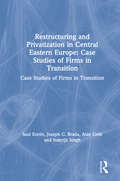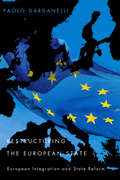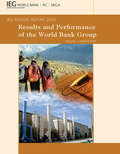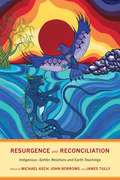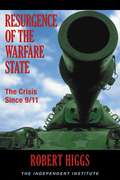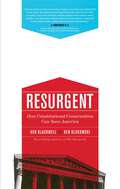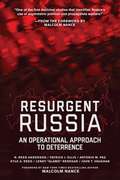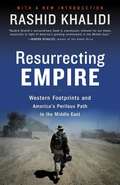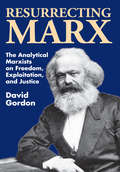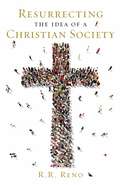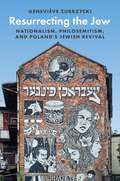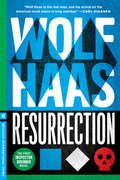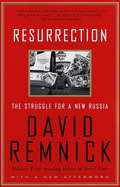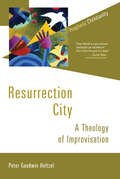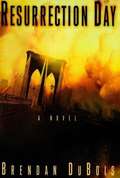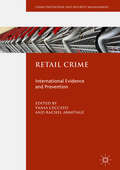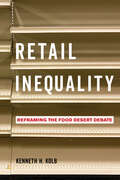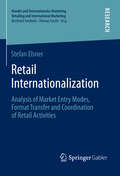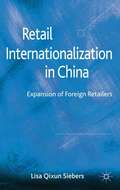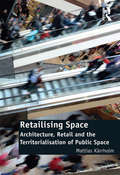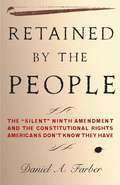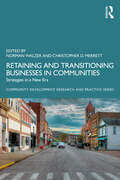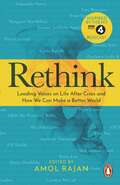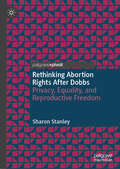- Table View
- List View
Restructuring and Privatization in Central Eastern Europe: Case Studies of Firms in Transition
by Alan Gelb Inderjit Singh Joseph C. Brada Saul EstrinThis volume presents cases from a World Bank study of state-owned industrial firms in Poland, Hungary and the Czech and Slovak republics. Topics that are covered include: structure of the industry; history of the firm; and product mix and sales pattern.
Restructuring the European State: European Integration and State Reform
by Paolo DardanelliSince 1950, devolution reforms have been widespread across Western Europe, leading to constitutional transformation in Belgium, Italy, Spain, and the United Kingdom, as well as the potential for state breakup, as witnessed by independence referendums in Scotland and Catalonia. Over the same period, European integration has transferred power upwards to what is now the European Union. The simultaneous occurrence of these seemingly contradictory trends raises fundamental questions. Is state restructuring a uniform process? Has it been fuelled by European integration and, if so, how? Restructuring the European State uses a comparative analysis to present a systematic investigation of the connections between European integration and state restructuring. Paolo Dardanelli argues that there are two distinct dynamics of state restructuring: “bottom up,” where one or more regions demand self-government; and “top down,” where the central government decides to devolve power. Through quantitative analyses of thirteen key phases of state restructuring in Belgium, Denmark, France, Italy, Spain, and the United Kingdom he shows that European integration has a powerful influence only in bottom up cases. Dardanelli points to a striking paradox of integration, whereby an ethos of Europe growing ever closer to union has become associated with fragmentation, divergence, and increased complexity, rather than a seamless system of multilevel governance. Innovative and rigorously researched, Restructuring the European State marks a major advance in our understanding of contemporary European politics.
Resurgence and Reconciliation: Indigenous-Settler Relations and Earth Teachings
by James Tully Michael Asch John BorrowsThe two major schools of thought in Indigenous-Settler relations on the ground, in the courts, in public policy, and in research are resurgence and reconciliation. Resurgence refers to practices of Indigenous self-determination and cultural renewal whereas reconciliation refers to practices of reconciliation between Indigenous and Settler nations, such as nation-with-nation treaty negotiations. Reconciliation also refers to the sustainable reconciliation of both Indigenous and Settler peoples with the living earth as the grounds for both resurgence and Indigenous-Settler reconciliation. Critically and constructively analyzing these two schools from a wide variety of perspectives and lived experiences, this volume connects both discourses to the ecosystem dynamics that animate the living earth. Resurgence and Reconciliation is multi-disciplinary, blending law, political science, political economy, women's studies, ecology, history, anthropology, sustainability, and climate change. Its dialogic approach strives to put these fields in conversation and draw out the connections and tensions between them. By using “earth-teachings” to inform social practices, the editors and contributors offer a rich, innovative, and holistic way forward in response to the world’s most profound natural and social challenges. This timely volume shows how the complexities and interconnections of resurgence and reconciliation and the living earth are often overlooked in contemporary discourse and debate.
Resurgence of the Warfare State: The Crisis Since 9/11
by Robert HiggsExploring the politics and morality that pulled the United States into wars in Afghanistan and Iraq, this collection of essays, stories, and satirical pieces lambasts the highest officials in the executive branch for incompetence and moral blindness.Immediately after 9/11, government officials and commentators claimed that the terrorist attacks had "changed everything." In contrast, economist and historian Robert Higgs warned that history would likely repeat itself in one key respect: the government&’s hasty reactions would resemble its responses to previous crises, providing little more than opportunities for special interests to feather their nests and for the government itself to expand its powers at the expense of the public&’s wealth and civil liberties. Resurgence of the Warfare State is Robert Higgs&’s real-time analysis of the U.S. government&’s tragic but predictable response: the quick enactment of the USA PATRIOT Act, the federal takeover of airport security, the massive increase in defense and other government spending, and the carnage in Afghanistan and Iraq wrought by leaders unaccountable for their costly and deadly mistakes. Governmental responses to crises have been—and will likely continue to be—a bonanza for political, corporate, and even religious opportunists who seek power and ?nancial gain by exploiting the fears of the American public.
Resurgent
by Ken Blackwell Ken KlukowskiAMERICA , THIS IS YOU R ROAD MAP TO THE FUTURE--A RETURN TO THE GUIDIN G PRINCI PLES OF OU R FOUNDIN G FATHERS . . . The United States is at a crossroads. Our national debt is rising, our social programs are unsustainable, and our government is expanding at an alarming rate. As American citizens, we have a choice. We can continue on our current path of policies that threaten our freedoms, our families, and our finances--or we can join the powerful new resurgence of the age-old principles that are the foundation of the U.S. Constitution. This book is a wake-up call. Written by acclaimed conservative leaders Ken Blackwell and Ken Klukowski, it is a back-to-basics action plan inspired by the original words and beliefs of our nation's forefathers. Using the U.S. Constitution, the authors guide us through our current political minefield, showing how both Democrats and Republicans have led our country astray. They reveal startling connections between the crash of the economy, the collapse of the family, and the rise of big government. They lay out a policy agenda of constitutional fixes for our greatest national problems, from retirement, to education, to social issues, to taxes. Finally, they offer Republicans a step-by-step plan for rebuilding the GOP from the ground up, for winning both Congress and the White House, and for changing directions on the road to our future. The time is now, America. The resurgence is under way; we should let nothing stop us. More than two centuries ago, our forefathers gave us the dream and the directions--spelled out in black and white. Now more than ever, we need to embrace those principles and get our country back on track.
Resurgent Russia: An Operational Approach to Deterrence
by Malcolm Nance R. Reed Anderson Patrick J. Ellis Antonio M. Paz Kyle A. Reed Lendy Alamo" Renegar John T. VaughanRelations between the United States and Russia have recently escalated from strained to outright aggressive. From imperial expansion in Ukraine to intervention in Syria to Russian hacking during the US election in 2016, it is clear that the United States must be prepared to defend itself and its NATO allies against Russian aggression.Resurgent Russia, researched and written by six residents and internationally experienced officers at the US Army War College, analyzes the current threat of Russian acts of war—both conventional military attacks and unconventional cyber warfare or political attacks—against the United Stated and NATO. The officers detail how the America can use its international military resources and political influence to both prepare for and deter aggression ordered by Vladimir Putin, making it clear that such an attack would be unsuccessful and therefore keeping the peace. This study provides a clear assessment of how the United States and its allies must utilize their political and military power to deter Russian aggression and maintain the hierarchy of power in today’s world.
Resurrecting Democracy
by Luke BrethertonThrough a case study of community organizing in the global city of London and an examination of the legacy of Saul Alinsky around the world, this book develops a constructive account of the relationship between religious diversity, democratic citizenship, and economic and political accountability. Based on an in-depth, ethnographic study, Part I identifies and depicts a consociational, populist and post-secular vision of democratic citizenship by reflecting on the different strands of thought and practice that feed into and help constitute community organizing. Particular attention is given to how organizing mediates the relationship between Christianity, Islam and Judaism and those without a religious commitment in order to forge a common life. Part II then unpacks the implications of this vision for how we respond to the spheres in which citizenship is enacted, namely, civil society, the sovereign nation-state, and the globalized economy. Overall, the book outlines a way of re-imagining democracy, developing innovative public policy, and addressing poverty in the contemporary context.
Resurrecting Empire
by Rashid KhalidiAuthor Rashid Koidi puts the U.S. invasion of Iraq in its historical context. He examines why people from the Middle East oppose America's war, given this area's history of colonial domination.
Resurrecting Marx: Analytical Marxists on Exploitation, Freedom and Justice ([studies In Social Philosophy And Policy #No. 14)
by David GordonThe last two decades have seen Marxism's academic renascence. In fields as diverse as law, literary criticism, history, and philosophy, Marxism once again captivates no small number of scholars. In part, this reassessment is driven by the efforts of a group of philosophers and economists to reconstruct Marx from the ground up on a more rigorous basis. The work of these "Analytical Marxists" — who include G.A. Cohen, Jon Elster, and John Roemer — is given a sustained examination and critique in David Gordon's Resurrecting Marx. The charge of the Analytical Marxists that capitalism is inherently exploitative and unjust is the primary subject of Gordon's book. Gordon takes issue with that contention; he argues that the Analytical Marxists' withering criticism of classical Marxism is essentially correct, but that they fail to replace it with a superior theoretical edifice. Gordon also analyzes the Analytical Marxists' reformulation of the Marxian notion of exploitation, the implications of their rejection of the labor theory of value, their differences over what rights people have, and their arguments for the compatibility of markets with socialism.
Resurrecting the Idea of a Christian Society
by R. R. RenoAmerica’s two greatest strengths-her liberal democratic culture and her free-market economy-have made her a global superpower. But left unchecked, these two strengths can become great cultural weaknesses, sowing selfishness, recklessness, and apathy. <P><P>In Resurrecting the Idea of a Christian Society, theologian R. R. Reno argues that America needs a renewal of Christian ideals-ideals that encourage self-sacrifice, responsibility, and solidarity. <P><P>Drawing on T.S. Eliot’s 1940 essay "The Idea of a Christian Society,” Reno shows how Christianity encourages "an abiding ambition for higher things” and a "moral vision” that can strengthen communities and transform America into a truly great nation.
Resurrecting the Jew: Nationalism, Philosemitism, and Poland’s Jewish Revival (Princeton Studies in Cultural Sociology #18)
by Geneviève ZubrzyckiAn in-depth look at why non-Jewish Poles are trying to bring Jewish culture back to life in Poland todaySince the early 2000s, Poland has experienced a remarkable Jewish revival, largely driven by non-Jewish Poles with a passionate new interest in all things Jewish. Klezmer music, Jewish-style restaurants, kosher vodka, and festivals of Jewish culture have become popular, while new museums, memorials, Jewish studies programs, and Holocaust research centers reflect soul-searching about Polish-Jewish relations before, during, and after the Holocaust. In Resurrecting the Jew, Geneviève Zubrzycki examines this revival and asks what it means to try to bring Jewish culture back to life in a country where 3 million Jews were murdered and where only about 10,000 Jews now live.Drawing on a decade of participant-observation in Jewish and Jewish-related organizations in Poland, a Birthright trip to Israel with young Polish Jews, and more than a hundred interviews with Jewish and non-Jewish Poles engaged in the Jewish revival, Resurrecting the Jew presents an in-depth look at Jewish life in Poland today. The book shows how the revival has been spurred by progressive Poles who want to break the association between Polishness and Catholicism, promote the idea of a multicultural Poland, and resist the Far Right government. The book also raises urgent questions, relevant far beyond Poland, about the limits of performative solidarity and empathetic forms of cultural appropriation.
Resurrection
by Annie Janusch Wolf HaasWhen the corpses of an American couple are found frozen to death on a ski lift in a pristine Alpine village, Brenner is called in to investigate, in his first case as a P.I.When Inspector Simon Brenner leaves the police force, he's looking forward to some peace and quiet, and the lovely Alpine village of Zell seems like just the place. That is, until the corpses of an American couple are found frozen on a ski lift, and Brenner, doing some part time work for an insurance company, is called in to investigate the matter. It turns out that the victims have relatives in the area, and the crime--if it is a crime--seems like it could be a family affair. Except the prime suspect has a solid alibi and no one in picture-perfect Zell is talking.So Brenner, in his inimitable style, draws out all the village's characters--the longtime residents, the resort staff and guests--and uncovers the dirty doings that lurk underneath the pristine snow...and family secrets long buried. This first book sets up the totally unique, quirky narrative voice that runs throughout the series and introduces the reluctant, yet brilliant, Detective Brenner,in a plot with as many twists and turns as a Double Black Diamond.
Resurrection
by David RemnickThe Pulitzer Prize-winning author of Lenin's Tomb now presents the crucial second act--the attempt to form a Russian state from the ruins of the U.S.S.R. and the chaotic election of 1996. As before, readers will turn to Remnick for the essential story, the flesh-and-blood account of one of history's great turning points.
Resurrection City: A Theology of Improvisation (Prophetic Christianity Series (PC))
by Peter Goodwin HeltzelIn Resurrection City Peter Heltzel paints a prophetic picture of an evangelical Christianity that eschews a majority mentality and instead fights against racism, inequality, and injustice, embracing the concerns of the poor and marginalized, just as Jesus did. Placing society's needs front and center, Heltzel calls for radical change and collective activism modeled on God's love and justice. In particular, Heltzel explores the social forms that love and justice can take as religious communities join together to build "beloved cities." He proclaims the importance of "improvising for justice" -- likening the church's prophetic ministry to jazz music -- and develops a biblical theology of shalom justice. His vision draws inspiration from the black freedom struggle and the lives of Sojourner Truth, Howard Thurman, and Martin Luther King Jr. Pulsing with hope and beauty, Resurrection City compels evangelical Christians to begin "a global movement for love and justice" that truly embodies the kingdom of God.
Resurrection Day
by Brendan DuboisIt's October 1972, 10 years since the Cuban missile crisis erupted into a full-blown nuclear war between the US and the USSR. The USSR is decimated, and the US is a shell of her former self...
Retail Crime: International Evidence and Prevention (Crime Prevention and Security Management)
by Vania Ceccato Rachel ArmitageThis edited collection provides an original and comprehensive take on retail crime and its prevention, by combining international data and multidisciplinary perspectives from criminologists, economists, geographers, police officers and other experts. Drawing on environmental criminology theory and situational crime prevention, it focusses on crime and safety in retail environments but also the interplay between individuals, products and settings such as stores, commercial streets and shopping malls, as well as the wider context of situational conditions of the supply chain in which crime occurs. Chapters offer state-of-the-art research on retail crime from a range of countries such as Australia, Brazil, Israel, Italy, Sweden, the UK and the USA. This methodological and well-researched study is devoted to both academics and practitioners from a variety of disciplines and backgrounds whose common interest is to prevent retail crime and overall retail loss. The chapters 'Crime in a Scandinavian Shopping Centre' and 'Perceived Safety in a Shopping Centre' are published open access under a CC BY 4.0 license at link.springer.com.
Retail Inequality: Reframing the Food Desert Debate
by Kenneth H. KolbRetail Inequality examines the failure of recent efforts to improve Americans' diets by increasing access to healthy food. Based on exhaustive research, this book by Kenneth H. Kolb documents the struggles of two Black neighborhoods in Greenville, South Carolina. For decades, outsiders ignored residents' complaints about the unsavory retail options on their side of town—until the well-intentioned but flawed "food desert" concept took hold in popular discourse. Soon after, new allies arrived to help, believing that grocery stores and healthier options were the key to better health. These efforts, however, did not change neighborhood residents' food consumption practices. Retail Inequality explains why and also outlines the history of deindustrialization, urban public policy, and racism that are the cause of unequal access to food today. Kolb identifies retail inequality as the crucial concept to understanding today’s debates over gentrification and community development. As this book makes clear, the battle over food deserts was never about food—it was about equality.
Retail Internationalization
by Stefan ElsnerThe doctoral thesis investigates various strategies in the area of going and being international of retail firms which is of undisputable relevance due to the fairly narrow research status and the increasing internationalization of retail activities. Issues are investigated concerning the choice of retail market entry modes, i. e. , the form ofinstitutional arrangements that retailers use when entering foreign markets, the retail format transfer, i. e. , the management of internal processes and the external marketing program elements and the coordination of retail activities, i. e. , the implementation ofthe marketing program by the organizational structure. Regarding this, three important research questions are addressed:1) How do choose retailers their market entry mode in the area of conflict between full and shared-controlled modes and how is this decision influenced by the internal and external environment? 2) How can international retailers transfer their retail format successfully to foreign countries by standardizing or adapting the internal and external elements of their retail format? 3) How can retailers successfully coordinate the implementation of their retail marketing program to culturally diversified markets? These questions are investigated on the basis of established theories applied from the international management literature such as institutional theory, the resource-based view and the profit maximization theory. On the basis of comprehensive primary and secondary datasets, important implications are drawn for research and practice.
Retail Internationalization in China
by Lisa Qixun SiebersChina is potentially the largest retail market in the world, attracting unprecedented attention from international retailers. Many experts claim that success in China not only provides access to this enormous market, but improves the capabilities of international retailers to succeed globally. Yet little research has been published on the expansion process of international retailers operating in China. Lisa Qixun Zhang fills this gap with her case study research and the presentation of a new theoretical model focusing on retailers' post-entry stage of internationalization. Her model provides an indispensible link between previous research on pre-entry and entry stages of retailer internationalization and future research on retailers' performance. Based on empirical results the author also offers pragmatic advice including: adapting to the local cultural and regulatory environment; identifying and evaluating locations for new international retailing operations; establishing a bridgehead for such operations; expansion and market development; and the challenges of learning from experience. "
Retailising Space: Architecture, Retail and the Territorialisation of Public Space (Ashgate Studies In Architecture Ser.)
by Mattias KarrholmOver the past few years there has been a proliferation of new kinds of retail space. Retail space has cropped up just about everywhere in the urban landscape: in libraries, workplaces, churches and museums. In short, retail is becoming a more and more manifest part of the public domain. The traditional spaces of retail, such as city centres and outlying shopping malls, are either increasing in size or disappearing, producing new urban types and whole environments totally dedicated to retail. The creation of these new retail spaces has brought about a re- and de-territorialisation of urban public space, and has also led to transformations in urban design and type of materials used, and even in the logic and ways through which these design amenities meet the needs of retailers and/or consumers. This book describes how the retailisation of public domains affects our everyday life and our use of the built environment. Taking an architectural and territorial perspective on this issue, it looks specifically at how retail and consumption spaces have changed and territorialised urban life in different ways. It then develops a methodology and a set of concepts to describe and understand the role of architecture in these territorial transformations.
Retained by the People: The "Silent" Ninth Amendment and the Constitutional Rights Americans Don't Know They Have
by Daniel A. FarberThe Ninth Amendment lurks like an unexploded mine within the Bill of Rights. Its wording is direct: "The enumeration in the Constitution of certain rights shall not be construed to deny or disparage others retained by the people. ” However, there is not a single Supreme Court decision based on it. Even the famously ambitious Warren Court preferred to rely on the weaker support of the Fourteenth Amendment’s Due Process Clause for many of its decisions on individual rights. Since that era, mainstream conservatives have grown actively hostile to the very mention of the Ninth Amendment. Daniel Farber, a law professor at the University of California at Berkeley, makes an informed and lucid argument for employing the Ninth Amendment in support of a large variety of rights whose constitutional basis is now shaky. The case he makes for the application of this unused amendment has profound implications in almost every aspect of our daily lives.
Retaining and Transitioning Businesses in Communities: Strategies in a New Era (Community Development Research and Practice Series)
by Norman Walzer Christopher D. MerrettThis edited collection presents successful business succession planning in smaller rural communities where profit margins are low, markets are shrinking, and there are few potential buyers. Finding innovative ways to successfully transition these businesses to new owners is at the heart of community and economic development efforts if many of these communities are to thrive in the future. Chapters outline options for successfully transitioning businesses that have worked in Canada, England, and the U.S. The book explores a variety of alternative approaches to transitioning small businesses to new owners using a different ownership model. A common theme running through these approaches is that employees and/or members of the community are engaged in working with or possibly owning the business in some cases. The book's discussions are not prescriptive, recommending specific models or strategies. Instead, they provide valuable insights into viable alternatives and suggest additional resource materials. This book is essential for academics, policymakers, and practitioners working on community and economic development issues, especially in areas with aging populations.
Rethink: How We Can Make a Better World
by Amol RajanAfter darkness, there is always lightIn a time of increasing uncertainty, Rethink offers a guide to a much-needed global 'reset moment', with leading international figures giving us glimpses of a better future after the pandemic. Each contribution explores a different aspect of public and private life that can be re-examined - from Pope Francis on poverty and the Dalai Lama on the role of ancient wisdom to Brenda Hale on the courts and Tara Westover on the education divide; from Elif Shafak on uncertainty and Steven Pinker on Human Nature to Xine Yao on masks and Jarvis Cocker on environmental revolution. Collectively, they offer a roadmap for positive change after a year of unprecedented hardship.Based on the hit BBC podcast, and with introductions by presenter and journalist Amol Rajan, Rethink gives us the opportunity to consider what a better world might look like and reaffirms that after darkness there is always light.RETHINK List of contributorsWHO WE ARECarlo Rovelli - Rethinking HumanityPope Francis - Rethinking PovertyPeter Hennessy - Rethinking DemocracyAnand Giridharadas - Rethinking CapitalismJared Diamond - Rethinking a Global ResponseZiauddin Sardar - Rethinking NormalityThe Dalai Lama - Rethinking Ancient WisdomC.K. Lal - Rethinking InstitutionsJarvis Cocker - Rethinking an Environmental RevolutionClare Chambers - Rethinking the BodySteven Pinker - Rethinking Human NatureTom Rivett-Carnac - Rethinking HistoryJonathan Sumption - Rethinking the StateWHAT WE DODavid Skelton - Rethinking IndustryEmma Griffin - Rethinking WorkCaleb Femi - Rethinking EducationGina McCarthy - Rethinking ActivismTara Westover - Rethinking the Education DivideKwame Anthony Appiah - Rethinking the Power of Small ActionsCharlotte Lydia Riley - Rethinking UniversitiesK.K. Shailaja - Rethinking DevelopmentSamantha Power - Rethinking Global GovernanceKT Tunstall - Rethinking the Music IndustryRebecca Adlington - Rethinking the Athlete's LifeBrenda Hale - Rethinking the CourtsNisha Katona - Rethinking HospitalityKatherine Granger - Rethinking the OlympicsDavid Graeber - Rethinking JobsJames Harding - Rethinking NewsCarolyn McCall Rethinking TelevisionHOW WE FEELMohammad Hanif - Rethinking IntimacyH.R. McMaster - Rethinking EmpathyCarol Cooper - Rethinking Racial EqualityPaul Krugman - Rethinking SolidarityAmonge Sinxoto - Rethinking SafetyReed Hastings - Rethinking TogethernessKang Kyung-wha - Rethinking AccountabilityLucy Jones - Rethinking BiophiliaColin Jackson - Rethinking Our Responsibility for Our HealthMirabelle Morah - Rethinking OurselvesNicci Gerrard - Rethinking Old AgeBrian Eno - Rethinking the WinnersJude Browne - Rethinking ResponsibilityElif Shafak Rethinking UncertaintyHOW WE LIVEAmanda Levete - Rethinking How We LiveNiall Ferguson - Rethinking ProgressDavid Wallace-Wells - Rethinking ConsensusMargaret MacMillan - Rethinking International CooperationHRH The Prince of Wales - Rethinking NatureOnora O'Neill - Rethinking Digital PowerMatthew Walker - Rethinking SleepHenry Dimbleby - Rethinking How We EatEliza Manningham-Buller - Rethinking Health InequalityPascal Soriot - Rethinking Medical Co-operationXine Yao - Rethinking MasksGeorge Soros - Rethinking DebtMariana Mazzucato - Rethinking ValueDouglas Alexander - Rethinking Economic DignityWHERE WE GOPeter Frankopan - Rethinking AsiaStuart Russell - Rethinking AIDeRay McKesson - Rethinking the ImpossibleV.S. Ramachandran - Rethinking BrainsSeb Emina - Rethinking TravelAaron Bastani - Rethinking an Aging PopulationRana Foroohar - Rethinking DataAnthony Townsend - Rethinking Robots
Rethinking Abortion Rights After Dobbs: Privacy, Equality, and Reproductive Freedom
by Sharon StanleyThis book offers a novel account of the normative foundations of abortion rights informed by political theory and feminist theory. Stanley revisits the debate between privacy and equality as rationales for abortion rights that erupted after Roe v. Wade. First, Stanley argues that we can reconceptualize privacy along feminist lines, contra its feminist critics. Second, this reconceptualization allows us to see privacy and equality as essential allies and supplements to each other. When operating in tandem, privacy and equality provide a powerful theoretical and practical foundation not only for abortion rights but also for an expansive vision of reproductive justice informed by an intersectional understanding of the reproductive burdens endured by those multiply marginalized by gender, race, and class. This reproductive justice framework is the most promising basis for a powerful post-Dobbs political coalition seeking to restore and greatly expand the promise of reproductive freedom symbolically represented by Roe.
